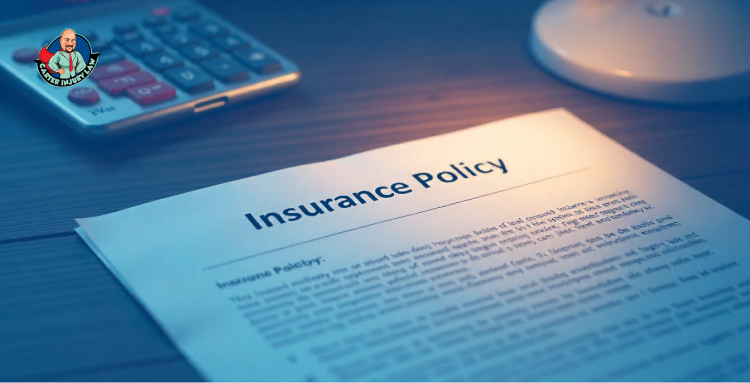
blog
April 6, 2025
Should You Take the First Offer from an Insurance Company?

One moment, life moves as it always has. The next, it fractures. An accident, a blur of pain and confusion, and suddenly, the world is no longer the one you knew. Before you can even make sense of it, the phone rings. The insurance company. Their voice is steady, practiced—almost kind. They have an offer. A few thousand dollars, handed over without trouble, without delay.
It sounds tempting, right ? After all, you have bills piling up, maybe even lost wages. Whereas there’s something unsettling about it—why are they in such a hurry? Why does it feel like they know something you don’t?
Maybe it’s because they do. And that’s exactly why you should think twice before saying yes.
(1) The First Offer: Why You Should Almost Always Say No
Right after an accident, the insurance company might come to you with an offer—$2,500, maybe $3,000—if you agree to release your claim. "We’ll give you this money right now," they say, as if they’re doing you a favor.
However, they’re not.
This is a lowball offer, plain and simple. The insurance company isn’t in the business to take good care of you—they’re in the business of saving money. And they know that if they can get you to settle early, before you even know the full extent of your injuries, they win.
Because here’s the thing—what if you’re more hurt than you think? What if your pain gets worse or you need more treatment down the road? If you take that first check, you’re done. You can’t go back and ask for more. That release is final.
So my advice is to never accept the first offer without talking to an attorney. A quick payout might seem nice at the moment, but your future health and financial stability are worth more than whatever they’re offering upfront.
(2) Evaluating a Settlement Offer Later in the Case

Once you’ve gone through treatment, the insurance company might come back with a new offer. This time, it’s a bigger number. It might even seem reasonable. However, before you even think about accepting, you need to ask yourself a few key questions:
Does it cover all my past medical expenses? Every bill, every doctor visit—those costs add up fast.
Will it reimburse my health insurance? If your insurance company paid anything for your treatment, they’re going to want their money back.
Am I being fairly compensated for pain and suffering? This isn’t just about bills. It’s about what you’ve been through.
What about future medical costs? Even if you have health insurance, you’ll still have co-pays, deductibles, and out-of-pocket expenses. Will this settlement take care of that?
Does it account for mental anguish or loss of enjoyment of life? Your injuries might not just affect you physically—they could change your entire quality of life.
What about my spouse? If your injuries have affected your ability to support your spouse emotionally or financially, they may have a claim, too.
A settlement isn’t just a number. It’s about making sure you’re fully covered—past, present, and future. If the offer doesn’t do that, then it’s not enough.
(3) The Insurance Company’s Real Goal
Insurance companies want you to think they’re on your side. However, make no mistake—their priority isn’t you.
The Adjuster’s Job Isn’t to Help You
That friendly voice on the phone? Their job is to settle your claim for as little as possible. They might sound sympathetic, but at the end of the day, they work for the insurance company—not for you.
Filing a Lawsuit Can Increase Their Offer
If you push back—if you file a lawsuit—their tune often changes. Why? Because they know that a trial could cost them a lot more than settling. Many times, just the threat of going to court can make them offer you more.
Going to Trial Might Be the Best Option
If they’re refusing to offer fair compensation, sometimes you have to take them to court. A jury sees what you’ve been through, and they’re not looking out for the insurance company’s profits—they’re looking at what’s fair.
A lowball offer isn’t them doing you a favor. It’s a tactic. And if they’re not offering you what you deserve, you have options.
Explore some of our other related blogs:
How to Handle Out-of-State Car Insurance Claims in Florida Accidents
How to Avoid Common Pitfalls in the Car Accident Claims Process in Florida
(4) When It Might Be Okay to Accept a Settlement

Not every settlement offer is bad. Sometimes, taking the offer makes sense—but only under the right circumstances.
If It’s the Full Policy Limits
Insurance policies have a maximum payout amount. If they’re offering you every dollar available under the policy, that might be as good as it gets. In that case, accepting could be the right move.
If They’re Offering Less Than the Policy Limits
Now, if they’re offering you less than the full policy limits, that’s when you need to stop and evaluate. Is this offer really enough? Does it cover everything—your medical bills, pain and suffering, and future treatment? If not, you may want to push back.
Only You Can Decide—But Get Legal Advice First
At the end of the day, it’s your case, your injuries, your life. You have to make the call. But an attorney can help you understand what’s fair, what’s not, and whether you’re being lowballed.
Settling isn’t always a bad thing, but don’t accept an offer without knowing exactly what you’re giving up.
Watch this video to hear more about how we can help you decide whether to accept an offer or fight for more.
(5) The Insurance Company Has a Strategy. So Should You—Call Carter Injury Law
Insurance companies know exactly what they’re doing when they make you an offer. Do you?
Understanding the Real Value of Your Claim
We will break down what your case is actually worth, factoring in medical bills, lost wages, pain and suffering, and future expenses. You deserve the full picture before making a decision.
You Have the Final Say, We’re Here to Guide You
We don’t make decisions for you. We give you the facts, the strategy, and the best advice based on years of experience. But at the end of the day, it’s your case, and you make the call.
We Don’t Work for Insurance Companies, We Work for You
Insurance adjusters are trained to minimize payouts. We’re trained to maximize them. Unlike them, we have one goal: fighting for you and making sure you get every dollar you deserve.
No Risk, No Upfront Fees
We offer free consultations, and you don’t pay us a dime unless we win your case. That means there’s no risk in reaching out. However, there’s a lot to lose if you settle too soon.
Recent posts
























